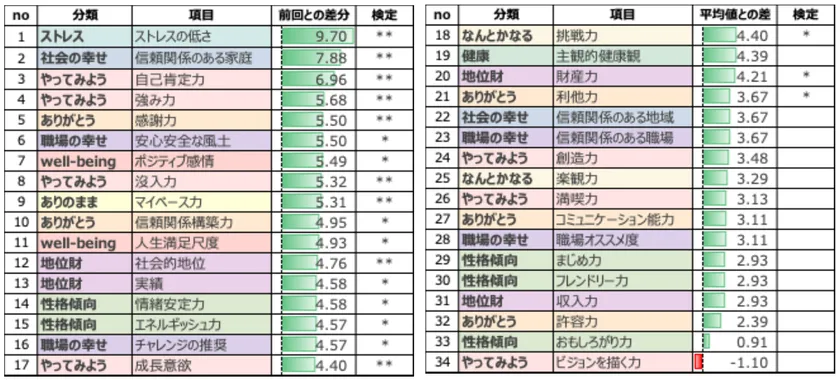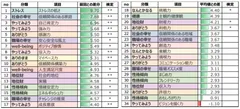Tsuchiya Corporation, a care provider, significantly improves employee happiness by +4.29 pt. Mindfulness Project also Improved Stress Reduction by +9.70pt ~Demonstrated stress reduction and self-esteem improvement after 8 weeks of practice
株式会社土屋
Tsuchiya Corporation (Head office: Ibara City, Okayama Prefecture; Representative Director: Toshiyuki Takahama; Enrollment: 2,881) is a social business enterprise that provides home nursing care for the severely disabled as well as day care services and home nursing care for the elderly throughout Japan.
In November 2025, our Well-being Committee (Chairman: Takesada Miyamoto) compiled a survey report on the level of happiness of participants in the Mindfulness Project based on the results of the "Happiness Diagnostic" conducted by HapiTech, Inc.
The results showed that the overall level of happiness of participants who practiced mindfulness for eight weeks increased by 4.29 ppt, with particularly large improvements in "low stress," "trust at home," and "self-affirmation. This confirmed that mindfulness has a positive impact on both work and personal life.
■ Background
In the nursing care industry, increased stress and mental health problems among caregivers have become a major issue for organizational management. We have been focusing on measures to support mental and physical health, aiming to create an environment in which each and every employee who provides support can continue to work in good health.
As part of these efforts, the Well-being Committee established a mindfulness circle "Refrel" in April 2024 with the aim of improving the wellbeing of employees. Ltd. has introduced "MELON," an online mindfulness program, and has been practicing it in a way that is easy to incorporate into daily life.
In order to verify the impact of mindfulness on employee well-being, 41 employees who had no experience with mindfulness were invited to participate in a continuous mindfulness activity for 30 minutes a day, at least three days a week, for eight weeks.
■Project Outline
Target group: Employees who had never practiced mindfulness before
Number of participants: 41
Period: August to September 2025 (8 weeks)
Activities: Mindfulness practice for 30 minutes at least three times a week
Implementation method: Morning activities (Zoom) or individually,
(online) by Melon Inc.
How to recruit participants:
The purpose of the project is explained to supervisors, who then call on their subordinates to participate. In some cases, supervisors themselves participated, and a wide range of participants, from managers to front-line staff, took part in the project.
Initiatives for continuation of the project:
The program is supported through active communication, such as daily activity checks and individual follow-ups with participants who have not yet achieved the three-weekly program.
Happiness Assessment Results by HapiTech, Inc.
In this project, changes in the level of happiness before and after mindfulness implementation were measured using the "Happiness Diagnostic" by HapiTech, Inc. The target group consisted of 39 of the 41 project participants who took the diagnostic test.
As a result of the 8-week mindfulness practice, the overall happiness score improved significantly by +4.29 points. By item, "low stress" (+9.70 pts), "trusting family" (+7.88 pts), and "self-affirmation" (+6.96 pts) improved particularly significantly. Furthermore, scores increased for almost all items, including "Strengths" (+5.68 pt) and "Gratitude" (+5.50 pt), and statistically significant improvements were confirmed for 20 of these items.
On the other hand, only "ability to create a vision" (-1.10 pt) decreased, but the difference was not statistically significant.
■Diagnostic Results in Graphs (Overall Results - Change over 2 Months)

Mindfulness Project Diagnostic Results
*Test
*: p<0.05, **: p<0.01
■Item analysis by HapiTech, Inc.
Many companies aim to "raise the overall happiness level by one point" over a period of six months to one year. In this context, the 4.29-point improvement in score in this project is an extremely remarkable achievement.
What is noteworthy about the results of this project is the well-balanced improvement in the overall level of happiness. In particular, "low stress" improved the most, suggesting that the reduction of stress brought out the positive aspects of human nature and had a positive effect on other components of happiness.
Self-affirmation is one of the most important indicators of happiness, and the fact that it increased significantly in this study indicates that mindfulness can promote self-understanding and self-acceptance, which may lead to a sustained sense of well-being.
In addition, although mindfulness is generally associated with "stress reduction," this analysis confirmed that it also significantly improves factors directly related to personal well-being, such as at work and at home. It was seen that mental stability facilitated communication not only at work but also at home, and furthermore, significant improvements were also seen in vitality-related items such as "desire to grow" and "challenge.
On the other hand, there was a slight decrease in "ability to create a vision," but no statistically significant difference was observed. Since mindfulness tends to focus on the "present moment" rather than the "future," it is possible that the participants prioritized focusing on the present situation during the short period of time.
■ Participants' comments (excerpts and modifications)
◎ I am less angry and no longer have big waves of feelings, so I can live a peaceful life.
◎ I have gotten into the habit of meditating before going to bed, which helps me relax. ◎ I am now able to accept myself in any state and feel that "it is OK to be myself as I am now.
◎ Even when I don't feel comfortable, mindfulness relaxes my mind, and on days when I do it before bed, I sleep better and have a good night's sleep.
◎ I was concerned about shallow breathing, but I learned how to consciously switch to deep breathing. The effects of the program can be seen in my blood pressure measurements during internal medicine visits, and I would like to continue it.
◎ In my hectic life, having time to face myself has helped me calm down, become aware of my physical ailments, and maintain my body and mind.
◎ Caregivers have a job that easily disrupts the rhythm of their lives and takes a heavy physical and mental toll on them, but there are few companies that offer this kind of initiative for their staff, so I feel this is a very good project.
◎ It was a time when I was feeling down in my private life, but being able to choose and implement classes and times that fit my situation helped me feel better and get back to my full potential. When I felt like falling apart, I was encouraged by the organizer who said, "One more time.
◎ By facing my senses, I feel that I am now able to spend a day comfortably while taking care of my feelings.
◎ Thanks to mindfulness, I am able to approach my work with a positive attitude. When I practice it, my mind becomes lighter.
Comments by Committee Chairperson, Mr. Takemono Miyamoto (including future outlook)

Well-being Committee Chairperson, Taketaka Miyamoto
As we are involved in nursing care, "a job that is deeply related to people's lives," we believe that the state of mind of the people we support must also be taken into consideration. Mindfulness is not just stress care, but an important process for carefully facing oneself and improving one's relationships with others.
Through this project, we have realized once again that each staff member's mindfulness and positive attitude toward daily support will lead to peace of mind for clients and their families. In the future, we intend to develop a support system to make mindfulness a habit, share the knowledge gained from this project within the industry, and disseminate it as a model case of wellbeing management in the nursing care industry. We will continue to promote initiatives that contribute to improving the wellbeing of the nursing care industry as a whole, starting with improving the well-being of workers.
Related URL
<Official website
<Official X (former Twitter)
<Official YouTube channel
https://www.youtube.com/channel/UCboj8uAyr_W7Vw4kT9HS7ng
Company Profile
Company name: Tsuchiya Corporation
Location :2F Hisayasu Central Building, 192-2 Ibara-cho, Ibara-shi, Okayama
Representative Director: Toshiyuki Takahama
Establishment :August 2020
Business description : Disability welfare service business and community life support business,
In-home service business based on the Long-Term Care Insurance Law,
Planning, holding, and operation of lectures and workshops, and training business,
Home-Visit Nursing Care Business
- Category:
- Research & Reports


